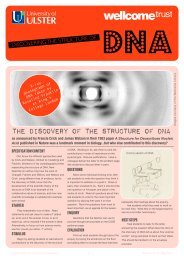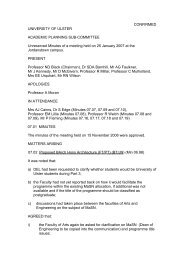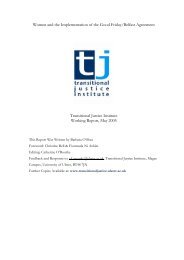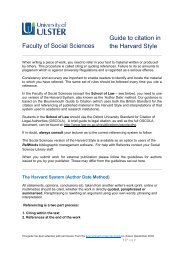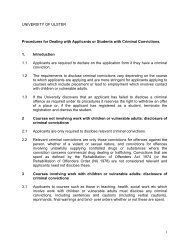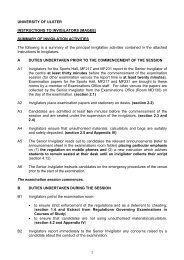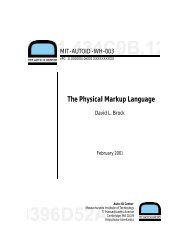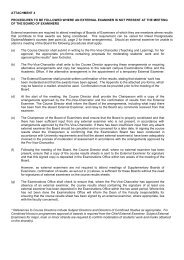Reparations in Northern Ireland – A duty to victims? - Transitional ...
Reparations in Northern Ireland – A duty to victims? - Transitional ...
Reparations in Northern Ireland – A duty to victims? - Transitional ...
You also want an ePaper? Increase the reach of your titles
YUMPU automatically turns print PDFs into web optimized ePapers that Google loves.
<strong>Reparations</strong> <strong>in</strong> <strong>Northern</strong> <strong>Ireland</strong> <strong>–</strong> A <strong>duty</strong> <strong>to</strong> <strong>victims</strong>?<br />
Patricia MacBride<br />
Commissioner for Victims and Survivors<br />
16 November 2011<br />
<strong>Transitional</strong> Justice Institute, University of Ulster
The transitional justice landscape <strong>in</strong> the north of <strong>Ireland</strong> is a constantly chang<strong>in</strong>g and evolv<strong>in</strong>g map.<br />
Yet through all of the <strong>in</strong>itiatives, programmes, reforms and restructur<strong>in</strong>g we have shied away from<br />
ma<strong>in</strong>stream<strong>in</strong>g the concept of reparations.<br />
To many people <strong>in</strong> the community, reparations are payments made by the los<strong>in</strong>g side <strong>to</strong> <strong>victims</strong> and<br />
survivors follow<strong>in</strong>g war. That creates difficulties. In our context, some contend that the community<br />
was at war, some characterise it as a civil conflict, and the euphemism of “the troubles” takes us no<br />
further along the road of agreement on manag<strong>in</strong>g transition after 30 years of conflict.<br />
It is perhaps the case that the term reparations, which is now so enshr<strong>in</strong>ed <strong>in</strong> the lexicon of<br />
transitional justice policy and practice, is someth<strong>in</strong>g our broader society th<strong>in</strong>ks is not right for our<br />
circumstances. In the majority of <strong>in</strong>ternational experiences, implementation of reparations placed a<br />
<strong>duty</strong> on the state <strong>to</strong> address the needs of <strong>victims</strong> and survivors. In accept<strong>in</strong>g such measures are<br />
needed there is the potential <strong>to</strong> place an unfair or undue burden on the state, and <strong>in</strong>deed <strong>to</strong> hold<br />
the state wholly accountable for all human rights violations that <strong>to</strong>ok place dur<strong>in</strong>g the conflict.<br />
In respect of l<strong>in</strong>k<strong>in</strong>g <strong>in</strong>itiatives, it could be viewed that prosecutions are concerned with perpetra<strong>to</strong>rs<br />
of wrong-do<strong>in</strong>g, truth-seek<strong>in</strong>g <strong>in</strong>itiatives and <strong>in</strong>stitutional reforms concern wider society, reparations<br />
are and primarily for the benefit of <strong>victims</strong>. To an extent, these areas are <strong>in</strong>tertw<strong>in</strong>ed: the question<br />
is have we, <strong>in</strong> deal<strong>in</strong>g with <strong>victims</strong> and survivors of our past, ensured that the co-dependency<br />
between <strong>in</strong>itiatives is managed?<br />
I will return <strong>to</strong> these areas later, but firstly I want <strong>to</strong> set out what is meant by reparations and go on<br />
<strong>to</strong> look, through a <strong>victims</strong> lens, what measures have been put <strong>in</strong> place <strong>in</strong> a northern <strong>Ireland</strong> context<br />
that could be said <strong>to</strong> meet that def<strong>in</strong>ition.<br />
United Nations General Assembly resolution 60/147 sets out the categorisation of reparations<br />
measures as follows 1 :<br />
Restitution refers <strong>to</strong> measures which “res<strong>to</strong>re the victim <strong>to</strong> the orig<strong>in</strong>al situation before the<br />
gross violations of <strong>in</strong>ternational human rights law and serious violations of <strong>in</strong>ternational<br />
humanitarian law occurred,” for example, res<strong>to</strong>ration of liberty, enjoyment of human rights,<br />
identity, family life and citizenship, return <strong>to</strong> one’s place of residence, res<strong>to</strong>ration of<br />
employment and return of property<br />
Compensation “should be provided for any economically assessable damage, as appropriate<br />
and proportional <strong>to</strong> the gravity of the violation and the circumstances of each case, result<strong>in</strong>g<br />
from gross violations of <strong>in</strong>ternational human rights law and serious violations of<br />
<strong>in</strong>ternational humanitarian law,” such as lost opportunities, loss of earn<strong>in</strong>gs and moral<br />
damage<br />
Rehabilitation “should <strong>in</strong>clude medical and psychological care as well as legal and social<br />
services.”<br />
Satisfaction is a broad category of measures, rang<strong>in</strong>g from those aim<strong>in</strong>g at a cessation of<br />
violations, <strong>to</strong> truth-seek<strong>in</strong>g, the search for the disappeared, the recovery and reburial of<br />
rema<strong>in</strong>s, public apologies, judicial and adm<strong>in</strong>istrative sanctions, commemoration and<br />
memorialization, and human rights tra<strong>in</strong><strong>in</strong>g.<br />
Guarantees of non-repetition is another broad category which <strong>in</strong>cludes <strong>in</strong>stitutional reforms<br />
tend<strong>in</strong>g <strong>to</strong>wards civilian control of military and security forces, strengthen<strong>in</strong>g judicial<br />
1 See General Assembly resolution 60/147, annex, paras. 19<strong>–</strong>23.<br />
1
<strong>in</strong>dependence, the protection of human rights workers, human rights tra<strong>in</strong><strong>in</strong>g, the<br />
promotion of <strong>in</strong>ternational human rights standards <strong>in</strong> public service, law enforcement, the<br />
media, <strong>in</strong>dustry and psychological and social services<br />
The United Nations has developed a suite of guides <strong>–</strong>the UN Rule of Law Tools for Post-Conflict<br />
States <strong>–</strong> which exam<strong>in</strong>e <strong>in</strong>itiatives for post-conflict society <strong>in</strong> areas such as truth commissions,<br />
reparations, reforms of exist<strong>in</strong>g structures etc. At the heart of this advice and guidance is that each<br />
process <strong>in</strong> a conflict transform<strong>in</strong>g society needs <strong>to</strong> be specific and tailored <strong>to</strong> the needs of that<br />
community; they are not prescriptive guides. The UN Secretary General has said: “we must learn…<br />
<strong>to</strong> eschew one-size-fits-all formulas and the importation of foreign models. Although the lessons of<br />
past transitional justice efforts help <strong>in</strong>form the design of future ones, the past can only serve as a<br />
guidel<strong>in</strong>e. Pre-packaged solutions are ill-advised. Instead, experiences from other places should<br />
simply be used as a start<strong>in</strong>g po<strong>in</strong>t for local debate and decisions.” In develop<strong>in</strong>g and deliver<strong>in</strong>g<br />
<strong>in</strong>itiatives around the conflict <strong>in</strong> the north of <strong>Ireland</strong>, we need <strong>to</strong> be particularly m<strong>in</strong>dful that we take<br />
from this learn<strong>in</strong>g that which is positive and applicable and that we can reach agreement on <strong>in</strong> a<br />
society which cont<strong>in</strong>ues <strong>to</strong> be divided<br />
What is a Victim?<br />
In terms of entitlement <strong>to</strong> reparations, we need <strong>to</strong> exam<strong>in</strong>e what we mean by <strong>victims</strong>. The<br />
legislation that gives me the statu<strong>to</strong>ry duties and powers <strong>to</strong> act as Commissioner for Victims and<br />
Survivors sets out the def<strong>in</strong>ition as follows 2 :<br />
(a) someone who is or has been physically or psychologically <strong>in</strong>jured as a result of or <strong>in</strong> consequence<br />
of a conflict-related <strong>in</strong>cident;<br />
(b) someone who provides a substantial amount of care on a regular basis for an <strong>in</strong>dividual<br />
mentioned <strong>in</strong> paragraph (a); or<br />
(c) someone who has been bereaved as a result of or <strong>in</strong> consequence of a conflict-related <strong>in</strong>cident.<br />
(2) Without prejudice <strong>to</strong> the generality of paragraph (1), an <strong>in</strong>dividual may be psychologically <strong>in</strong>jured<br />
as a result of or <strong>in</strong> consequence of—<br />
(a) witness<strong>in</strong>g a conflict-related <strong>in</strong>cident or the consequences of such an <strong>in</strong>cident; or<br />
(b) provid<strong>in</strong>g medical or other emergency assistance <strong>to</strong> an <strong>in</strong>dividual <strong>in</strong> connection with a conflictrelated<br />
<strong>in</strong>cident.”<br />
The International Centre for <strong>Transitional</strong> Justice further def<strong>in</strong>es a victim as:<br />
“Persons who <strong>in</strong>dividually or collectively suffered harm, <strong>in</strong>clud<strong>in</strong>g physical or mental <strong>in</strong>jury,<br />
emotional suffer<strong>in</strong>g, economic loss, or substantial impairment of their fundamental rights, through<br />
acts or omissions that constitute gross violations of <strong>in</strong>ternational human rights law, or serious<br />
violations of <strong>in</strong>ternational humanitarian law… the immediate family or dependants of the direct<br />
victim and persons who have suffered harm <strong>in</strong> <strong>in</strong>terven<strong>in</strong>g <strong>to</strong> assist <strong>victims</strong> <strong>in</strong> distress or <strong>to</strong> prevent<br />
victimization.” 3<br />
The fundamental difference <strong>in</strong> these two def<strong>in</strong>itions would appear <strong>to</strong> be that the second also<br />
<strong>in</strong>cludes those who have suffered harm through acts of omission, as well as the concept of<br />
collectivity.<br />
2 Victims and Survivors (<strong>Northern</strong> <strong>Ireland</strong>) Order 2006<br />
3 Magarrell, L (2007). <strong>Reparations</strong> <strong>in</strong> Theory and Practice. Reparative Justice Series, ICTJ.<br />
2
The def<strong>in</strong>ition of a victim is someth<strong>in</strong>g which cont<strong>in</strong>ues <strong>to</strong> cause friction <strong>in</strong> our society and we often<br />
hear political leaders talk about <strong>victims</strong> and <strong>in</strong>nocent <strong>victims</strong> and put forth an op<strong>in</strong>ion that<br />
perpetra<strong>to</strong>rs are separate. But the po<strong>in</strong>t about the conflict <strong>in</strong> and about northern <strong>Ireland</strong> is that<br />
there were no w<strong>in</strong>ners and losers <strong>–</strong> the state did not w<strong>in</strong>, nor did those who opposed the state and<br />
therefore we have no vic<strong>to</strong>r. In the absence of this declaration, we have an uneasy situation where<br />
we must accept that none of the ac<strong>to</strong>rs <strong>in</strong> the conflict can walk away with a clear conscience and<br />
clean hands <strong>–</strong> wrong was perpetrated on all sides.<br />
The success, I believe, <strong>in</strong> the def<strong>in</strong>ition conta<strong>in</strong>ed <strong>in</strong> the Commission’s empower<strong>in</strong>g legislation is that<br />
it fails <strong>to</strong> judge the actions of those who have died and <strong>to</strong> categorise them as victim or perpetra<strong>to</strong>r<br />
but focuses its attention on the liv<strong>in</strong>g <strong>–</strong> those who have been bereaved, <strong>in</strong>jured or are carers. As<br />
such, it is pragmatic <strong>in</strong> that it recognises the need aris<strong>in</strong>g out of grief, regardless of the<br />
circumstances of the bereavement.<br />
<strong>Reparations</strong> <strong>–</strong> How far have we gone?<br />
In the context of the north of <strong>Ireland</strong>, a number of <strong>in</strong>itiatives have been delivered that might be<br />
<strong>in</strong>terpreted as go<strong>in</strong>g some way <strong>to</strong>wards meet<strong>in</strong>g society’s <strong>duty</strong> of reparations <strong>to</strong> <strong>victims</strong> and<br />
survivors but further exam<strong>in</strong>ation of the merits of some of those <strong>in</strong>itiatives is warranted.<br />
1. Restitution<br />
In terms of res<strong>to</strong>r<strong>in</strong>g the victim <strong>to</strong> the orig<strong>in</strong>al situation before the violation occurred, it<br />
could be argued that the follow<strong>in</strong>g sample <strong>in</strong>itiatives have provided a measure of<br />
restitution.<br />
The establishment of the Human Rights Commission sought <strong>to</strong> place a human rights<br />
agenda at the heart of society where previously the imperative had been one of<br />
survival and self-preservation.<br />
In terms of identity, government policy which has promoted the growth of Ulster<br />
Scots and the Irish language have helped <strong>to</strong> build confidence of communities<br />
The right <strong>to</strong> assert citizenship as be<strong>in</strong>g either Irish or British which is enshr<strong>in</strong>ed <strong>in</strong><br />
Good Friday Agreement has further addressed issues around identity<br />
In respect of the return of property, the end<strong>in</strong>g of Operation Banner, for example,<br />
and the return of previously vested lands by the MOD <strong>to</strong> their owners or <strong>to</strong><br />
community use have created economic and social benefits<br />
None of these examples, however, are victim-centred but rather have an impact on the<br />
wider community, albeit with <strong>victims</strong> form<strong>in</strong>g part of that wider community. There is no one<br />
identity for <strong>victims</strong>, no one area of land that <strong>victims</strong> were forced out of. We must ask if<br />
there are further <strong>in</strong>itiatives therefore that need <strong>to</strong> be taken <strong>in</strong> terms of restitution that is<br />
specific <strong>to</strong> <strong>victims</strong>.<br />
2. Compensation<br />
Material compensation has received more attention than any other area of reparations.<br />
The Crim<strong>in</strong>al Injuries Compensation Scheme provided a measure of f<strong>in</strong>ancial restitution <strong>to</strong><br />
some but not all <strong>victims</strong> and survivors. Dur<strong>in</strong>g the course of the conflict, the operation of<br />
the compensation system evolved and was amended. In the early days, compensation<br />
awards for those bereaved were decided through the courts <strong>–</strong> sometimes on the steps of<br />
3
the courts - and were therefore at the discretion of a judge or subject <strong>to</strong> negotiation by legal<br />
representatives. This created a system up until 1978 where awards varied widely and there<br />
was no element of the payment which acknowledged the pa<strong>in</strong> and loss of bereavement.<br />
The Crim<strong>in</strong>al Injuries (Compensation) Order of 1988 <strong>in</strong>troduced a provision for a<br />
bereavement award. In 2002 a tariff scheme was <strong>in</strong>troduced which set a scale for damages<br />
<strong>to</strong> be paid and did also <strong>in</strong>clude acknowledgement of loss. The scale was revised <strong>in</strong> 2009 and<br />
applicants had the right of appeal <strong>to</strong> an appeals panel who had the discretion <strong>to</strong> amend<br />
awards. This situation cont<strong>in</strong>ues <strong>to</strong> the present day. At no stage were families of<br />
paramilitaries killed dur<strong>in</strong>g the conflict eligible <strong>to</strong> receive compensation. Furthermore,<br />
families of former paramilitary prisoners, who had completed their sentences and were<br />
killed, (not whilst engag<strong>in</strong>g <strong>in</strong> illegal activities) were not eligible <strong>to</strong> receive compensation<br />
payments.<br />
Compensation for those who were seriously <strong>in</strong>jured was calculated <strong>in</strong> terms of loss of<br />
earn<strong>in</strong>gs and life expectancy. It should have ensured these <strong>victims</strong> and survivors had a<br />
decent quality of life for the rest of their lives, but capp<strong>in</strong>g the award at 16 years loss of<br />
earn<strong>in</strong>gs meant that for those <strong>in</strong>jured <strong>in</strong> the 1970’s, their compensation was woefully<br />
<strong>in</strong>adequate.<br />
All of this has contributed <strong>to</strong> great <strong>in</strong>equity between <strong>victims</strong> and survivors <strong>in</strong> respect of the<br />
compensation they were awarded.<br />
A number of <strong>in</strong>itiatives have provided ex gratia payments <strong>to</strong> <strong>victims</strong> and survivors. The<br />
Remembrance Commission which was established by the Irish government and operated<br />
between 2003 and 2008 distributed almost €3.9 million <strong>to</strong> <strong>in</strong>dividual <strong>victims</strong> and survivors<br />
and <strong>in</strong> excess of €2 million <strong>to</strong> fund support services <strong>to</strong> <strong>victims</strong> resident <strong>in</strong> the state.<br />
The <strong>Northern</strong> <strong>Ireland</strong> Memorial fund was established <strong>in</strong> 2001 and has provided f<strong>in</strong>ancial<br />
assistance <strong>to</strong> <strong>victims</strong> s<strong>in</strong>ce that time. The Irish Government’s Remembrance Commission<br />
committed <strong>in</strong>itial fund<strong>in</strong>g of €2 million <strong>to</strong> the Fund. Because of how the Memorial Fund<br />
records its <strong>in</strong>formation, it is not possible <strong>to</strong> tell how many <strong>in</strong>dividual <strong>victims</strong> and survivors<br />
have been assisted by it. Applicants could apply for assistance year on year so it is possible<br />
some people have received assistance under a number of schemes over a number of years.<br />
Special payments of almost £70 million were made <strong>to</strong> former full and part-time members of<br />
the Ulster Defence Regiment when that regiment was disbanded. In the current year a fund<br />
of £20 million has been made available <strong>to</strong> provide gratuity payments <strong>to</strong> former members of<br />
the RUC Reserve. In 2000 the RUC bereaved and seriously <strong>in</strong>jured fund was given £9 million<br />
and a further £2 million was disbursed <strong>to</strong> widows of RUC officers killed prior <strong>to</strong> 1982 who<br />
had been f<strong>in</strong>ancially disadvantaged. This £9 million was disbursed through the Police Fund,<br />
which cont<strong>in</strong>ues <strong>to</strong> receive an annual budget <strong>in</strong> the region of £2 million from the<br />
Department of Justice.<br />
Name of organisation Total Fund available Number of Average payment per<br />
Beneficiaries<br />
victim/survivor<br />
Remembrance €1,637,920 309 €5,300<br />
4
Commission (Irish<br />
Government 2003-<br />
2008)<br />
Acknowledgement<br />
Payments<br />
Remembrance<br />
Commission (Irish<br />
Government 2003-<br />
2008)<br />
Economic Hardship<br />
Payments<br />
(Spouse/dependent<br />
children)<br />
Remembrance<br />
Commission (Irish<br />
Government 2003-<br />
2008)<br />
One-off payment <strong>to</strong><br />
those rendered<br />
permanently <strong>in</strong>capable<br />
of work<strong>in</strong>g<br />
Remembrance<br />
Commission (Irish<br />
Government 2003-<br />
2008)<br />
Treatment of <strong>in</strong>juries<br />
Remembrance<br />
Commission (Irish<br />
Government 2003-<br />
2008)<br />
Exceptional Medical<br />
Payments<br />
UDR/Royal Irish<br />
Regiment Special<br />
Payments (Part time<br />
Reserve)<br />
€461,250 34 €13,566<br />
€646,000 48 €13,458<br />
€69,213 28 €2,472<br />
€1,042,510 77 €13,539<br />
£14.28m 1020 4 £14,000<br />
UDR/RIR Special<br />
Payments <strong>–</strong> Full Time<br />
Service IN ADDITION <strong>to</strong><br />
redundancy and<br />
Pension<br />
£55.44m 5 1980 6 £28,000<br />
RUC Hear<strong>in</strong>g Loss<br />
Claim Fund<br />
£11,348,466 7 515 8 £22,035<br />
NI Police Fund £1.85m 9 747 10 £2,477<br />
4<br />
Figure from UDR/RIR Aftercare Service Annual Report 2008-2009<br />
5<br />
A <strong>to</strong>tal fund of £250m was made available <strong>to</strong> the UDR/RIR <strong>in</strong> respect of the redundancy, pension and special<br />
payments above when the regiment was disbanded. Only ex gratia payments are noted here.<br />
6<br />
As at note 1<br />
7<br />
Figures correct as at 30/09/2008. At that date 1,236 cases were still <strong>to</strong> be assessed<br />
8<br />
PSNI FOI Request response F-2008-04813<br />
9<br />
Figures from NI Police Fund Website for the 2010/2011 year only<br />
5
(An Annual budget of<br />
£1.8m)<br />
RUC Reserve Gratuity<br />
Payment Scheme<br />
RUC Pre-1982 Widows<br />
package November<br />
2000<br />
RUC<br />
bereaved/seriously<br />
<strong>in</strong>jured fund November<br />
2000<br />
NI Memorial Fund<br />
2010-2011<br />
3. Rehabilitation<br />
£20m 6000 11 £3,333<br />
£2m 80 £25,000<br />
£9m 12 TBC TBC 13<br />
£1,515,370 14 2,708 £560<br />
The rehabilitation of <strong>victims</strong> and survivors is def<strong>in</strong>ed as the provision of medical and<br />
psychological care and the provision of legal and social services, and so one could contend that a<br />
number of government <strong>in</strong>itiatives have gone some way <strong>to</strong> meet<strong>in</strong>g those needs<br />
In 2009 the S<strong>to</strong>rmont Executive endorsed a Victims and Survivors 10 year strategy<br />
built around the three strands of deal<strong>in</strong>g with past, meet<strong>in</strong>g present need and<br />
build<strong>in</strong>g for future<br />
The establishment of the Commission for Victims and Survivors <strong>in</strong> 2009 set <strong>in</strong> place<br />
statu<strong>to</strong>ry provision for review<strong>in</strong>g law, practice and services relat<strong>in</strong>g <strong>to</strong> <strong>victims</strong> and<br />
the need <strong>to</strong> ensure <strong>victims</strong> voices were heard at the heart of government. The<br />
Commission’s focus <strong>in</strong> the current year is the preparation of a Comprehensive Needs<br />
Assessment which will report <strong>in</strong> March 2012 and quantify need around areas such as<br />
physical and mental health and well-be<strong>in</strong>g, social support, truth, justice and<br />
acknowledgement and personal development<br />
In the current fund<strong>in</strong>g period for government, £36 million has been allocated <strong>to</strong><br />
<strong>victims</strong> and survivors and provides a range of support <strong>in</strong>clud<strong>in</strong>g social support,<br />
tra<strong>in</strong><strong>in</strong>g and personal development, advocacy support, fund<strong>in</strong>g <strong>to</strong> meet health and<br />
well-be<strong>in</strong>g needs (primarily listen<strong>in</strong>g ear and counsell<strong>in</strong>g services), befriend<strong>in</strong>g<br />
4. Satisfaction<br />
Provid<strong>in</strong>g satisfaction <strong>to</strong> <strong>victims</strong> and survivors may <strong>in</strong>clude <strong>in</strong>itiatives and processes such as truthseek<strong>in</strong>g,<br />
the search for the disappeared, public apologies, judicial and adm<strong>in</strong>istrative sanctions and<br />
commemoration and memorialisation..<br />
10<br />
This is the <strong>to</strong>tal number of grants paid <strong>in</strong> 2010/2011 and it is possible applicants received more than one<br />
grant<br />
11<br />
Exact number not know as yet, this is based on press reports <strong>–</strong> numbers have been requested from DoJ<br />
12<br />
A <strong>to</strong>tal of £11m announced of which £2m was <strong>to</strong> address <strong>in</strong>equalities <strong>in</strong> pensions <strong>to</strong> widows bereaved prior<br />
<strong>to</strong> 1982<br />
13<br />
This provided fund<strong>in</strong>g <strong>to</strong> the NI Police Fund for a number of years, exact breakdown <strong>to</strong> be confirmed<br />
14<br />
NIMF F<strong>in</strong>ancial Assistance, non-means tested schemes for one year only<br />
6
It is <strong>in</strong> this area of judicial and adm<strong>in</strong>istrative sanctions that we have potential <strong>to</strong> see the greatest<br />
overlap <strong>in</strong> terms of reparations <strong>in</strong>itiatives designed through a victim perspective and the area of<br />
legal remedies that has impact across wider society.<br />
The Independent Commission for Location of Victims’ Rema<strong>in</strong>s was established <strong>in</strong>1999 by<br />
Treaty between the British and Irish Governments. The purpose of the Commission is <strong>to</strong><br />
obta<strong>in</strong> <strong>in</strong>formation, <strong>in</strong> strict confidence, which may lead <strong>to</strong> the location of the rema<strong>in</strong>s of<br />
"the Disappeared" (those killed and buried <strong>in</strong> secret by proscribed organisations prior <strong>to</strong> 10<br />
April 1998 as a result of the <strong>Northern</strong> <strong>Ireland</strong> conflict). Although concerned with the deaths<br />
of only 16 people <strong>–</strong> a fraction of 1% of those who died <strong>–</strong> the Commission is significant for a<br />
number of reasons. Firstly for the n<strong>in</strong>e families whose loved-ones have been returned <strong>to</strong><br />
them for burial, it is unlikely that this would have happened without the <strong>in</strong>itiative. Secondly,<br />
the fact that the Irish and British Governments act<strong>in</strong>g jo<strong>in</strong>tly <strong>in</strong>itiated and funded the<br />
Commission gave it <strong>in</strong>ternational stand<strong>in</strong>g . Thirdly, it represented the first time that former<br />
combatants <strong>–</strong> <strong>in</strong> this case former members of the IRA <strong>–</strong> engaged voluntarily with an agency<br />
of the state <strong>in</strong> respect of its wrongdo<strong>in</strong>gs.<br />
In recent times we have seen an <strong>in</strong>crease <strong>in</strong> the number of public apologies delivered by the<br />
state where it has been responsible for conflict-related deaths. The most prom<strong>in</strong>ent of<br />
these was follow<strong>in</strong>g the publication of the Saville report <strong>in</strong><strong>to</strong> Bloody Sunday. The apology<br />
delivered by Prime M<strong>in</strong>ister David Cameron was significant not only <strong>in</strong> its delivery but <strong>in</strong> the<br />
reaction <strong>to</strong> that amongst the people of Derry gathered <strong>to</strong> hear the f<strong>in</strong>d<strong>in</strong>gs and amongst the<br />
families of those killed and those who were wounded <strong>in</strong> terms of their positive welcom<strong>in</strong>g of<br />
it. This apology followed a long and protracted public <strong>in</strong>quiry which clearly established the<br />
facts of that day. Set aga<strong>in</strong>st that, however, is the more recent apology <strong>to</strong> the family of Pat<br />
F<strong>in</strong>ucane delivered <strong>in</strong> parallel <strong>to</strong> an announcement that a senior judicial figure would review<br />
the papers <strong>in</strong> the case <strong>in</strong> private, where such an apology has been cited as hollow by those<br />
campaign<strong>in</strong>g for an <strong>in</strong>quiry <strong>in</strong><strong>to</strong> Mr. F<strong>in</strong>ucane’s kill<strong>in</strong>g because it was delivered without the<br />
full facts of the case be<strong>in</strong>g made public. One must also consider apologies delivered by<br />
former combatants <strong>in</strong> the wake of their ceasefires. In the case of Loyalism express<strong>in</strong>g<br />
“s<strong>in</strong>cere and abject remorse” for its actions and <strong>in</strong> the case of the IRA who offered “s<strong>in</strong>cere<br />
apologies and condolences” <strong>to</strong> the bereaved families of non-combatants and<br />
acknowledgeded the grief and pa<strong>in</strong> of the families of combatants. The question rema<strong>in</strong>s<br />
whether an apology <strong>in</strong> the absence of any other truth or justice-seek<strong>in</strong>g <strong>in</strong>itiative is enough.<br />
The subject of commemoration and memorialisation is one that society cont<strong>in</strong>ues <strong>to</strong><br />
struggle with. Collective commemoration of those who lost their lives as a result of the<br />
conflict is challeng<strong>in</strong>g because it is tied <strong>to</strong> the issue of def<strong>in</strong>ition of <strong>victims</strong> and firmly-held<br />
beliefs that there are “<strong>in</strong>nocent” and “guilty” <strong>victims</strong>. One <strong>in</strong>itiative that has had a measure<br />
of success is the Day of Private Reflection established by Heal<strong>in</strong>g Through Remember<strong>in</strong>g<br />
which takes place on 21 June each year and urges society <strong>to</strong> remember <strong>in</strong> its own way those<br />
who have suffered as a result of the conflict and had only a limited number of collective<br />
events. The development of the Maze/Long Kesh site is a further example of difficulties<br />
around agreement <strong>in</strong> this area. Broad agreement between the major political parties that<br />
the site of the former prison should be developed <strong>to</strong> <strong>in</strong>clude a conflict transformation centre<br />
and exhibition space has been reached, but there will cont<strong>in</strong>ue <strong>to</strong> be significant discussion<br />
and debate as that project progresses over how the past is <strong>in</strong>terpreted at that site. We are a<br />
long way off from collective commemoration.<br />
5. Guarantees of non-repetition<br />
This f<strong>in</strong>al category of reparations <strong>in</strong>cludes <strong>in</strong>stitutional reforms that seek <strong>to</strong> <strong>in</strong>crease civilian<br />
control of military and security forces, strengthen<strong>in</strong>g judicial <strong>in</strong>dependence, the protection<br />
7
Conclusion<br />
of human rights. Such guarantees of non-repetition, however, can only ever be implicit <strong>in</strong> a<br />
sense that it is about creat<strong>in</strong>g the political and societal conditions where a return <strong>to</strong> armed<br />
conflict is difficult or impossible <strong>to</strong> contemplate or enact. It depends on the confidence of<br />
society and of those <strong>in</strong> marg<strong>in</strong>alised groups <strong>in</strong> the new political arrangements and the ability<br />
of those arrangements <strong>to</strong> protect their human rights, identity, lives and livelihoods and as<br />
such are part of an uneasy peace-build<strong>in</strong>g process rather than a fully fledged peaceful<br />
society.<br />
The Patten Commission which exam<strong>in</strong>ed the Royal Ulster Constabulary and made<br />
recommendations regard<strong>in</strong>g its renam<strong>in</strong>g as the Police Service of <strong>Northern</strong> <strong>Ireland</strong>,<br />
its size, make-up, recruitment procedures and operations could be seen ass part of<br />
the <strong>in</strong>stitutional reforms that embed a new paradigm <strong>in</strong> a society <strong>in</strong> transition.<br />
Likewise the Review of Crim<strong>in</strong>al Justice System consultation process, the<br />
appo<strong>in</strong>tment of an At<strong>to</strong>rney General for <strong>Northern</strong> <strong>Ireland</strong>, the establishment of an<br />
<strong>in</strong>dependent Judicial Appo<strong>in</strong>tments Commission, establishment of Public<br />
Prosecution Service as opposed <strong>to</strong> a Crown Prosecution Service have changed the<br />
landscape of the justice system and it is proposed that further reform will take place<br />
<strong>in</strong> respect of the Prison Service <strong>to</strong> br<strong>in</strong>g it <strong>in</strong><strong>to</strong> l<strong>in</strong>e with other reforms that have<br />
taken place<br />
The establishment of the Office of Police Ombudsman was an important part <strong>in</strong><br />
establish<strong>in</strong>g civilian oversight of polic<strong>in</strong>g and embedd<strong>in</strong>g a culture of public<br />
accountability. Notwithstand<strong>in</strong>g the current difficulties of that office <strong>in</strong> respect of<br />
his<strong>to</strong>ric cases, reports by the Crim<strong>in</strong>al Justice Inspec<strong>to</strong>rate have judged its work on<br />
contemporary matters <strong>to</strong> be satisfac<strong>to</strong>ry.<br />
The violations that reparations benefits are meant <strong>to</strong> redress are usually of the sort that is<br />
irreparable. Noth<strong>in</strong>g will res<strong>to</strong>re a victim <strong>to</strong> their situation before their loss, whether that loss was<br />
as a result of susta<strong>in</strong><strong>in</strong>g a physical or psychological <strong>in</strong>jury , or after the loss of a parent, a sibl<strong>in</strong>g, a<br />
spouse or a child. No amount of money and no comb<strong>in</strong>ation of benefits can erase either such<br />
experiences or some of their consequences. This is no excuse for <strong>in</strong>action. However, understand<strong>in</strong>g<br />
the <strong>in</strong>herent limitations of what we can do and communicat<strong>in</strong>g those limitations effectively <strong>to</strong> wider<br />
society and <strong>to</strong> <strong>victims</strong> and survivors affects the way they are established and run, and the benefits<br />
that can flow from them.<br />
Whilst we must acknowledge that significant societal changes and a number of victim-centred<br />
<strong>in</strong>itiatives have taken place, we cannot th<strong>in</strong>k that the job is done by any means. We therefore still<br />
have a <strong>duty</strong> <strong>to</strong> <strong>victims</strong> <strong>to</strong> cont<strong>in</strong>ue the process of reparations, embrac<strong>in</strong>g all of the areas of need.<br />
In the north of <strong>Ireland</strong>, transitional justice as a concept is not widely embraced. The harsh political<br />
reality is that for many advocates and practitioners work<strong>in</strong>g with <strong>victims</strong> and survivors, it is seen as<br />
someth<strong>in</strong>g rather academic and remote and not practical, supportive or reparative. Politically, those<br />
from the Catholic/Nationalist/Republican community are more predisposed <strong>to</strong> embrace the<br />
opportunities afforded <strong>to</strong> reform or repair <strong>in</strong>stitutions that did not work and <strong>to</strong> make restitution <strong>to</strong><br />
those who have suffered harm or disadvantage than are their counterparts <strong>in</strong> the<br />
Protestant/Unionist/Loyalist community. We are do<strong>in</strong>g little <strong>to</strong> address that perception.<br />
Some transitional justice practice would say that States have a legal <strong>duty</strong> <strong>to</strong> acknowledge and<br />
address widespread or systematic human rights violations, <strong>in</strong> cases where the state caused the<br />
8
violations or did not seriously try <strong>to</strong> prevent them. In the past, reparations were seen as punitive -<br />
someth<strong>in</strong>g that was paid by the los<strong>in</strong>g side <strong>to</strong> the vic<strong>to</strong>r <strong>–</strong> and we have not fully done our job as<br />
advocates, academics and practitioners <strong>in</strong> successfully re-brand<strong>in</strong>g the product <strong>to</strong> make it fit its 21 st<br />
century purpose.<br />
Part of the problem <strong>in</strong> the north of <strong>Ireland</strong> is that the state itself was not the only viola<strong>to</strong>r of human<br />
rights and yet it seems it is be<strong>in</strong>g held more accountable for right<strong>in</strong>g the wrongs <strong>in</strong>flicted by others<br />
simply because there is no mechanism yet <strong>in</strong> place that can hold all of the ac<strong>to</strong>rs <strong>to</strong> the conflict <strong>to</strong><br />
account.<br />
<strong>Transitional</strong> justice practice is clear on this, though and states that: “The state should... provide<br />
reparations <strong>to</strong> <strong>victims</strong> of rebel groups as well as of groups that were not under government control<br />
or acquiescence. This <strong>duty</strong> can arise either as a matter of law - for failure <strong>to</strong> guarantee rights...or out<br />
of basic fairness <strong>to</strong> <strong>victims</strong>, who should be treated similarly regardless of who the perpetra<strong>to</strong>r is,<br />
s<strong>in</strong>ce this is out of their control. One of the purposes of reparations is <strong>to</strong> help facilitate <strong>victims</strong>’<br />
<strong>in</strong>tegration <strong>in</strong> society, <strong>to</strong> make them feel that the rest of society cares about what happened <strong>to</strong> them<br />
by provid<strong>in</strong>g some k<strong>in</strong>d of redress. It is also a way <strong>to</strong> distribute across society the costs of provid<strong>in</strong>g<br />
redress for harm. In this way, the state can provide reparations not because it was responsible for<br />
wrongdo<strong>in</strong>g, but because of its obligation <strong>to</strong> provide for the common good and <strong>to</strong> assist <strong>in</strong><br />
re<strong>in</strong>tegrat<strong>in</strong>g <strong>victims</strong> - without mak<strong>in</strong>g dist<strong>in</strong>ctions as <strong>to</strong> who committed the crimes.” 15<br />
Until we put <strong>in</strong> place mechanisms <strong>to</strong> deal with the legacy of conflict which has a 360 degree<br />
perspective, we cannot fully meet our <strong>duty</strong> <strong>to</strong> <strong>victims</strong> and survivors and <strong>to</strong> build<strong>in</strong>g a new and<br />
<strong>in</strong>clusive shared society.<br />
15 As at 3<br />
9




